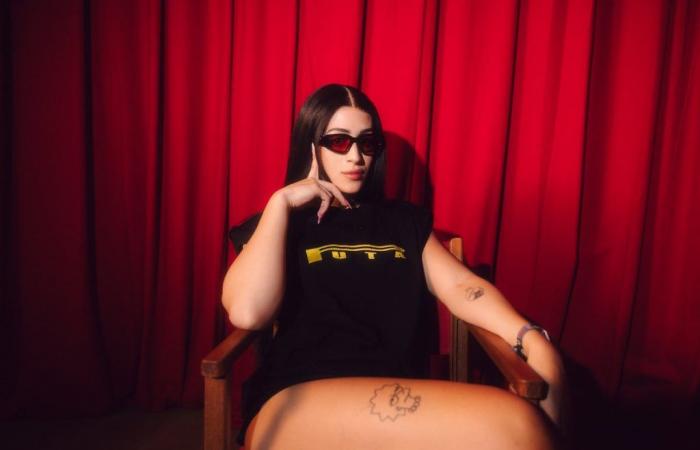
Until recently it seemed that if talking about Villano Antillano it was inevitable to start with the song that launched her to world fame back in the summer of 2022. In the BZRP Music Sessions #51the Puerto Rican rapper joined the Argentine producer Bizarrap and together they produced that inexplicable chemistry that turns some of the songs recorded in the famous blue light room into a hit viral.
At the time of writing these lines, the piece is about to surpass 260 million views on YouTube and 305 million on Spotify, dizzying figures that leave no doubt about the global impact of that performance. However, for some time now the Puerto Rican artist has had many more things to talk about.
Seen from a certain distance, Villana Santiago – her real name – remembers the recording with Bizarrap “with great gratitude and happiness that there has been constant and sustained growth. “I’m winning”it states, with complete reason. Since then, the artist has positioned herself as one of the most interesting references in her country’s music, something not so simple considering that she comes from a place from which musicians such as Ozuna, Anual AA, Young have emerged in recent years. Miko, Rauw Alejandro, Paloma Mami and, obviously, Bad Bunny.
Villana is also a reference for the LGBTQ+ community, both musically, Villano Antillano is the most listened to trans and non-binary woman of the moment and the first to enter Top 50 from Spotify Global; as well as at a political and protest level. However, she admits that sometimes she would like to be just another artist. “I’m at a stage in my life where I’ve taken a little more seriously about prioritizing myself, my safety, and the safety of my people,” she explains. “I recognize the place I occupy and no one knows one hundred percent the challenges and obstacles I face in the industry and in my daily life. But I’m playing smart right now. It’s what keeps me hopeful and with access to at least some happiness.”
Complicated origins
Although she began releasing music before beginning her transition, Villana recognizes that when she found herself was when she was able to start creating without fear, “and beyond fear there are always great things. I have always said that I did not understand myself well as a music creator until I transitioned,” she underlines the musician.
Regarding her origins, Villana remembers that she grew up “surrounded by music,” and continues “I always knew how to speak through certain songs, even if they weren’t mine. Many influences, many forbidden things… And I’m so awesome! I think the more they tried to prevent me, the more I became obsessed with one day being as indomitable as possible. I started writing and making very experimental audiovisuals with an old computer I had for university. By then I had already had to leave home but I didn’t stay at the university either. There were many things uncertain. That filled me with anger and in turn inspired me to create art.”
Due to her sexual condition, Villana was expelled from her home when she was only 17 years old. Her parents, strict and conservative, did not know how to admit at that moment that her daughter was not what they had thought. The personal experiences lived during that time are at the roots of her lyrics, they are born from violence, rejection and having to dedicate herself to sex work because there was no other way to survive. Although also of the love and refuge of her community, of her friends who welcomed her and took care of her in bad times.
Music appeared in Villana’s life as a vehicle of expression through which she could find her way; cause and effect. Years later, not many, her goal with music remains the same. “I have always wanted to express myself and enjoy what I do,” she says, “that is distorted by capitalism, but that has always been the idea, to transcribe what I feel. I have very complex experiences because I live a very interesting life and I enjoy it, and I dare to talk about it, that’s all right now. I think it connects with people because more and more we have to do the impossible to close big gaps and everyone needs to feel unstoppable at least once a day.”
However, even now, there are still obstacles in the way. The music industry continues to have a “complicated” relationship with diversity, to put it mildly. For this reason, Villano’s relationship with her has always been very difficult, although it has changed. “It has evolved through my continued commitment to wanting to do things differently and being able to set clear boundaries,” he explains. “The men around you always have some opinion or some complaint even if you are giving your 300%. Really, most have never had to respect a woman like me. So there is a particular resistance to even giving me the basic things that all other people deserve and have, because deep down they don’t read you as a person. One understands it little by little when she knows how to sit down and analyze things.”
At the end of the day, my conscience, my values and my principles are what decide if I will be able to sleep at night.
“I think that in terms of society and ideologies, perhaps women have advanced and in some ways men have gotten stuck, because we are changing and seriously threatening their system,” she continues. “I have a lot of problems with this industry but they all stem from my almost instinctive aversion to assimilation (something people always struggle with I think). At the end of the day, my conscience, my values and my principles are what decide if I will be able to sleep at night. This industry is misogynistic, but it is also racist, classist, fatphobic, ableist, harboring predators, etc., and all of these oppressions are intertwined because they respond to the hegemony and whims of the ‘traditional’ white man, who is truly our enemy. “I think we will have made some progress when these questions are asked of cis-heterosexual white men and not of us.”
Machismo, Puerto Rico and the rise of the extreme right
A situation that the singer also extends to her country that, despite having artists like herself or Bad Bunny, contributing in their own way to change things, seems to remain committed to maintaining the old forms of discrimination against women and LGBTQ+ groups. . “I think that, in Puerto Rico, women are doing everything we can to resist and fight; and men do absolutely nothing or remain in gray areas because they don’t care or because they don’t suffer from it,” she points out. “In addition, Puerto Rico is one of the last colonies in the world that, long before I was born, incredible and inhumane austerity measures have been imposed on us: we do not have public schools, we do not have hospitals or access to healthcare, much of the time we do not We have electrical energy… We have no conscience because we cannot think about anything other than anger, because it is everywhere. It pains me to say it, but they have brought us into submission through the inaccessibility of things, which is quite common among empires and colonizers.”
“Men in this country are violent or cover up for other violent men,” he continues. “But we are also seeing that people are becoming more desperate and radicalized in religion because life is difficult and sometimes churches are support groups that can save your life. We see a lot of need and all these things connect.”
The singer, who studied Political Science, also relates these events to the rise of the extreme right worldwide. “I don’t think that people are bad because they want to (with the exception of psychological conditions), I think that there are many lost, poor and desperate people who are listening to people who profit from them,” she says. “I think this is a problem of the rich against the poor at heart, and it is easy to wash our hands and blame those who suffer the consequences of being radicalized, without first pointing out those who led them there. “I think we can recognize that men in Puerto Rico are incredibly violent and that the system is to blame at the same time.”
New topics
“I’m a scammin hoe / you want one of those / you a body motherfucker / you need PTO“, this is how the chorus of Villano Antillano’s penultimate song sounds, Clonazepamela, a topic with which she admits to being very obsessed. “It fits perfectly into my new album,” she says. “I think it carries a very serious, big-league energy… I think it’s the best thing I’ve done so far. The music video fascinates me, we put everything into it but at the same time it was not very complex for the people who worked on it. Those who are artists, are artists. The level is the level.”
“I currently view my career with a lot of gratitude,” she continues, “because I have been able to discern the wolves in sheep’s clothing around me, because I have taken my time to transition medically and properly and now I have access to enjoy it all through myself. . I am grateful that my work has led me to meet great friends who today I consider sisters and who accompany me along the way. Things are moving quickly now that the hormones have been doing their thing for years and I look so different. That also has implications for my career. The whores [apelativo que reivindica para sí misma] “We paid a very high price to mint that seal and I have many more problems now because society almost conditions us to hate seeing a woman in any position of power.”
These are hectic days in Villano Antillano’s career. In addition to this release, which was followed just a few days later by another song recorded with Jedet, titled sextapewe just had her in our country performing on the ‘Red Sound Studio by Etnia Barcelona’ stage within the framework of the Primavera Sound festival in Barcelona, where a select group of fans, journalists and influencers They were able to enjoy an intimate performance in a space that recreated the environment of a recording studio and the calm and relaxed atmosphere in which musicians perform that part of their work that is often hidden from outsiders. insiders.
The performance was another chapter in the artist’s relationship with Barcelona, a city that loves her and whose affection she also shares. “I love Barcelona. There is something about always being able to see the sea for me that brings me closer to home. Madrid is incredible, Spain is the truth… But Barcelona and that beach have given me unforgettable moments. Plus, anyone who knows me knows that I’m very vampire, and that gothic air that the city takes over leaves me new. I am so far from home in Europe, imagine! “I feel like Dracula’s bride walking drunk through those alleys,” she concludes.





